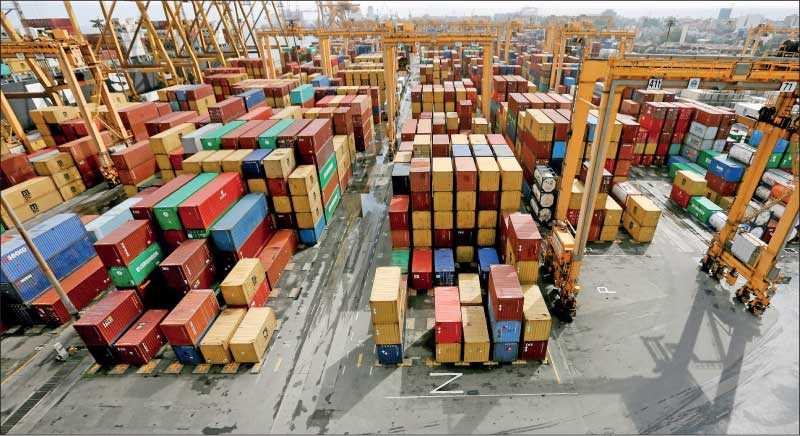Monday Feb 16, 2026
Monday Feb 16, 2026
Monday, 9 November 2020 00:10 - - {{hitsCtrl.values.hits}}

 The Government of Sri Lanka is scheduled to announce the national budget for the upcoming fiscal year on 17 November. It is a time that the country is at serious crossroads having many challenges to overcome in both domestic and external fronts.
The Government of Sri Lanka is scheduled to announce the national budget for the upcoming fiscal year on 17 November. It is a time that the country is at serious crossroads having many challenges to overcome in both domestic and external fronts.
The Sri Lanka Logistics and Freight Forwarders’ Association (SLFFA) expects pragmatic policy directions to revive the economy and the business climate of Sri Lanka. The polices that we look forward have to be long term, targeting stable growth for post-COVID recovery. SLFFA believes, while the Government has to fully focus on improving the international trading environment in Sri Lanka, a greater focus should be on expanding export industry, given that Sri Lanka is in a tough position in foreign exchange reserves.
However, Government also must realise that curtailing imports has a severe impact on the domestic economy through supply chain disruptions and continuously eradicating many jobs with it. Therefore, the budget 2021, has to carefully structure to target budget deficit, while gradually reopening the trading environment where the curtailed imports for the manufacturing sector for exports and the domestic economy as well as for intermediaries should be relaxed to increase economic activities within the country.
Many logistics companies that depend on the import business for multiple industries have seen their businesses being shrunk by more than 50%. Some companies are struggling to operate. Many have curtailed employment and have been downsizing operations hoping for a resurrection of the trading environment. We observe that the export industry remains steady, but this too will depend on the external factors and how our buyers would react to local operational requirements.
The logistics industry has been actively supporting the trade and the Government to keep the economic activities moving, even during the COVID lockdowns. The port of Colombo has been operating under challenging circumstances to service its clients. While appreciating the first step of starting operations at the East Container Terminal (ECT), the Government must announce its national approach on the logistics and the port sector, as currently it is unclear of the direction and the Government policy on public private sector partnerships. The industry has pointed out many reforms that are needed in the logistics and the freight forwarding industry in multiple forums.
SLFFA welcomes the announcement made by the Government that it would continue with the National Export Strategy (NES), where, logistics has been identified as a key driver for economic growth and export expansion. The 2021 national policy statement should focus on key areas that will give confidence to global service providers who are looking at Sri Lanka as a destination to expand logistics related services. The following areas are key for development of the logistics and freight forwarding industry.
1. Port infrastructure – Increasing port capacity is paramount for Sri Lanka to retain its transshipment hub status which will have a multiplier effect for many sectors in the logistics industry and exports. Therefore, executing the port’s strategy is a priority for the country.
2. Focusing on promoting Sri Lanka as a distribution hub – The concept of a distribution hub has been talked about for more than a decade. Indeed, Sri Lanka has tremendous potential to develop storage and warehousing business, expand on the hub concept and increase multi-country consolidation and entrepot trade as international players are looking for cost effective hubs with the transformation of the industry due to COVID-19. Therefore, the national budget should have a clear focus on these areas which can generate large amount of foreign exchange and new jobs.
3. Logistics master plan – The Government must finalise the logistics master plan and identify suitable land that could be released for investment for the local companies as well as international investors who would be keen to invest via the Board of Investment. SLFFA expects clear and simple legal process, to increase the international distribution centre capabilities that would attract global customers to use Sri Lanka as the preferred destination for many logistics services that are currently happening through other global hubs.
4. Fast tracking trade facilitation – With COVID-19, most countries and our competitors are adapting technology to improve logistics costs. It is vital that a policy decision is taken to accelerate the work that is going on to develop a national single window for automated trade transactions that would reduce Sri Lanka’s transaction costs to be competitive as a regional hub. The reforms will need structural adjustments as well as legal procedure amendments in many state institutions that are linked to the logistics industry and are directly or indirectly facilitators of international supply chains that Sri Lanka is connected to and is hoping to expand to bring in more business.
5. Knowledge and skills development – We expect the Government to take decisive steps to upskill and re-skill the industries to cater to the new world demand for technology driven sectors, global supply chain management needs specialised skills and knowledge, hence it is vital to include the subject of logistics and freight management to the school curriculum as recommended by the National exports Strategy (NES)
SLFFA, is confident that Sri Lanka can benefit greatly through international supply chains. If the country can attract part of the global trade shifts that are happening due to both economic and political reasons the overall economy can benefit. It is a given that Sri Lanka is very well located in the Indian Ocean to service many markets of the Asian, African and Middle Eastern regions and the east west trade routes to provide the economic environment that is developing and transforming world trade, including e-commerce and near shoring requirements for growing and highly populated markets around the island.
SLFFA’s view on why Sri Lanka’s has not progressed to its full potential on logistics, is lack of consistent policy and direction on how we position ourselves to promote the concept of logistics with international partners to transform the destination into a world class and world recognised centre of excellence. For this purpose, and to move out of the challenging environment Sri Lanka is currently facing, we believe, a good and a stable logistics industry will help the country to achieve its foreign exchange goals; if right policies are adopted in this key sector in the upcoming national budget Sri Lanka can face the challenges that are ahead of us.